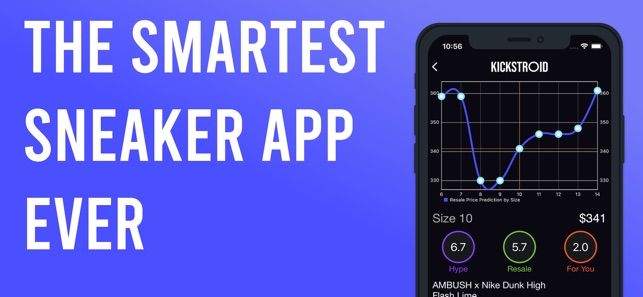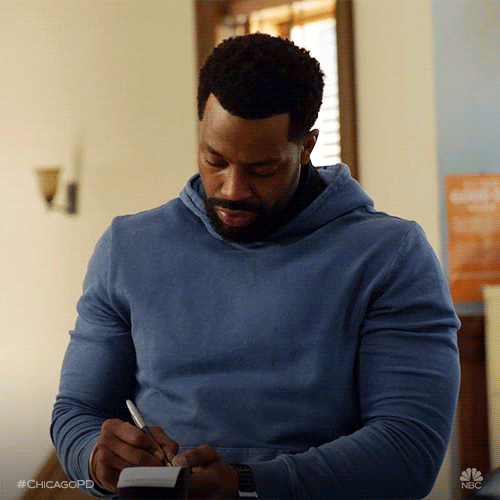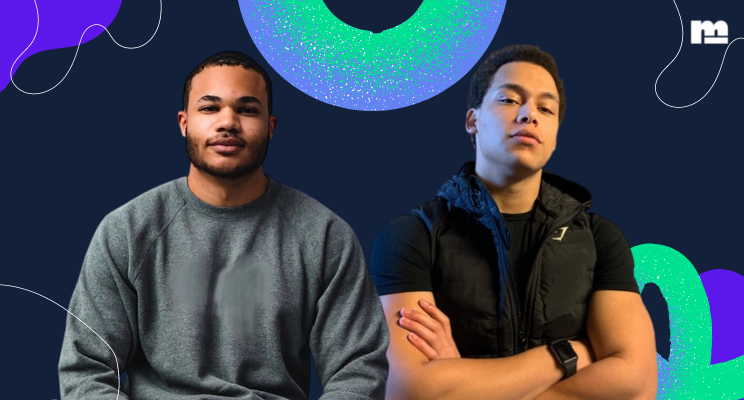Whether you've spent time trying to get the newest J's or Yeezy's, or you just really love sneakers, Kickstroid is the app you need to become a sneakerhead.
Kickstroid, coined as the "smartest sneaker app ever," is an easy-to-use app that helps you stay knowledgeable about sneakers, and in tune with the latest sneaker news and/or drops.

Created to be the ultimate tool for sneakerheads, Kickstroid uses machine learning to bring sneaker culture straight to your fingertips. Also, with Kickstroid, you can take advantage of:
- A sneaker detection feature that uses coreML (machine learning) to give you all the deets on your sneaker
- A sneaker drop feature that uses coreML to estimate the resale price prediction, as well as a breakdown of the place the sneaker has in the culture and the value you can get from owning it
- A sneaker battle feature that allows you to discover new sneakers while also allowing the app to build a "For You" preference profile based on what you vote for in the app

Sounds dope right?
Well, the journey of building this ultimate sneaker app hasn't been easy, and it's consisted of pivots, pivots, and MO' pivots.
But, if we're being honest here, that's the REAL way entrepreneurship works. It's not gonna be a cakewalk and your biz idea won't be a success overnight.
For Kickstroid, the founders David Alston and Nicco Adams went through so many pivots and iterations before they finally found product-market fit.
Their story is packed with so many gems for anyone that's currently building a startup or is thinking about launching one. If that's you, keep reading to get David and Nicco's unfiltered, no BS, lessons learned.

Lesson #1: Find a co-founder who loves the biz idea just as much as you do
Nicco and David met while attending the University of Illinois and realized they had two things in common:
#1: They both loved sneakers
#2: They saw the big picture in creating a business centered around sneakers
But before they met, David, who learned how to code early on, had already built several apps and had a huge interest in entrepreneurship. One of the apps David built before Kickstroid was a social network type of app, but it completely flopped. As David shared, "In all honesty, I think it flopped because I didn't know the market. So for my next idea, I knew I wanted to work on something where I am the market, and I know the space like the back of my hand. So I started building Kickstroid."
Soon after that, David met Nicco and they just clicked.
Nicco understood why Kickstroid existed. He was a natural creative that had a love for building content, and David was the brains behind the tech. Once they decided to be cofounders, they went all the way in and relentlessly sought out resources to help them grow. A year later, during their Senior year, they got into Apple's Entrepreneur Camp, and things turned all the way up.
Related: Startup funding opportunities for founders

Lesson #2: Figure out your unique advantage to stand out
Up until now, Kickstroid has had so many launches, pivots, and iterations, but guess what - that's pretty common for any early-stage startup.
When you're building something, it may take you a good ole minute to find product-market fit and your secret sauce.
As David shared, "Looking back, I can say that we didn’t really have an unfair advantage at our first launch. In our first launch of Kickstroid, there wasn't enough differentiation in what we were building. Our goal has always been to build a platform that's the bridge between the culture and all the new sneakerheads coming up. We realized that so many people are sneakerheads but they don't know it yet, because there are a number of barriers that hold people back. One of the toughest barriers is obviously the financial ones, but being a sneakerhead is more than that. It's more than just being able to have a wall behind you with a bunch of fucking shoes. It's actually about following the sneaker news, and having love for the stories behind the sneakers because sneakers all have a story."
That original ideal made perfect sense, but David and Nicco soon realized it wasn't enough.

David shared, "It was never something where the voice was distinct enough or loud enough to become anything greater than that. We had already begun working on different versions of Kickstroid, but when Apple came to the table, they were like we see your vision, we see what you're working on, let us introduce you to Excalibur, which is machine learning. They were like, let us show you something that's going to completely change how you think about technology, and what you can do with an app. Man, the lessons that Apple gave us, the wisdom on the actual technology, just took us to the next level."
This change in direction and lessons learned from going through Apple's Entrepreneur Camp have helped Kickstroid develop what makes them saucy and different in the market.
Now with the new version of Kickstroid, sneakerheads can get deeper insights, and are able to understand the culture in a completely different way. They can now use Kickstroid to recognize patterns, and even things like price prediction can be more accurate. Before Kickstroid, a lot of sneakerheads would just look at an upcoming sneaker and guesstimate how much the resale price would be. Now with Kickstroid, this app does it for you because they use machine learning to get predictions.
Lesson #3: Iterate, iterate, and then iterate AGAIN
So you have a biz idea. You think you'll just launch it, get customers, and make plenty of money. But, it ain't that easy (at all).
David and Nicco tried soooo many different ways to get customers. Some strategies worked well, some worked okay, and the others - well, let's just say they probably made David and Nicco frustrated as hell.

Related: How to develop a launch strategy for your business by the founder of Sunday to Sunday, Keenan Beasley
"We tried countless methods of advertising. We started off doing Reddit ads, Instagram ads, Facebook ads, and a couple of other things too. Some worked, and some didn’t. With that being said, for the ones that worked, I would break them down and try to get a better understanding. For example, I would look at why this type of ad, on this type of platform, is getting this type of conversion. I would try to figure out why it was performing better than other ads on the other platforms. Then I would compare it to a different ad on the same platform, and then see how it would go. From there, I would use that data to iterate, iterate, and iterate again, while also finding new methods of advertising to get downloads," David told us.
In the end, the user acquisition method that Kickstroid loved the most was working with micro-influencers. They decided to go this route because they knew iteration and trying new things was key.
As David shared, "Winston Churchill once said, 'to improve is to change, to perfect is to change often.' This quote is perfect when you think about entrepreneurship and getting customers or users. There's never going to be one way of doing things - it’s all about continuous iteration, and refining what you do. That's just the best and only way to do it."

On top of all of that, when you're getting customers, you shouldn't sleep on your network either.
As Nicco told us, "The whole reason you have a network is to actually network and build relationships so when it's time for you to put your product out, you have people that will back you. People don't realize it, but there is real power in tapping into data and into your network, no matter what industry you're in. Not leveraging your network and diving deep into your data, is one of the reasons why a lot of startups fail."
Lesson #4: Get that SSL certificate
Have you ever visited a website and saw that "Not Secure" warning next to the address in the website bar? Not only does it look bad, but it gives off major red flags.
The best way to fix this is by having an SSL certificate. An SSL certificate will keep your user's data secure and will make your site look trustworthy among other things. Once you get your SSL certificate, you'll have the "HTTPS" in your URL instead of just "HTTP," which is the secure version.
David cosigns Let's Encrypt for your SSL certificate.
"A lot of these websites will charge you like 100 or 200 a year for an SSL certificate but you can actually get it for free. Once you get your domain, go look up free SSL certificates and find a trustworthy one. I would say look into Let’s Encrypt to get an SSL certificate. You’ll end up saving about 200 bucks a year. I know it seems small, but when you’re bootstrapping, that's a whole lot of money," David shared.

Lesson #5: Lift up others as you climb
"Kickstroid would not be where it's at right now without so many Black entrepreneurs deciding to help us for nothing in return like James Whitner, Mandela Dixon, and David Butler from Hue House. With Kickstroid, we want to not only create a platform for ourselves but use that platform to uplift other people. So many Black entrepreneurs and other Black people in tech have done so much to wrap their arms around us, help us grow, and trust our own ideas," David shared.
Related: Mandela SH Dixon on why *this* is your most important pitch
David's testimony is really one of the most important lessons learned today. Although the Black startup community is out here growing and flourishing, we can do more to make sure none of us are not sleeping on our ideas. As a founder, creative, or biz leader, do your part in supporting and uplifting other Black entrepreneurs.
Remember, when one of us wins, we all win. Let's make sure we are all getting the bag no matter what.

